Mystery Of Famous Viking Ruler Rollo: DNA Experts Seek The Truth About His Identity
AncientPages.com - Forensic experts from Denmark and Norway have opened a sarcophagus containing the remains of descendants of Viking ruler Rollo in Normandy, France.
DNA studies will hopefully once and for all answer the question: Where did the mighty Viking ruler Rollo come from? The identity of the Viking ruler Rollo is of great historical significance. Historians have not been able to determine whether Viking Rollo was from Denmark or Norway.
The answer will also be important to the British royal family because their family descended from Rollo.
Who Was Viking Ruler Rollo?
Viking Rollo was the founder and first ruler of Normandy, the Count of Rouen and the great-great-great grandfather of William the Conqueror, the first Norman King of England.
There are many famous Vikings whose identity is unknown, one of them is Viking Rollo. He was born in the latter half of the 9th century somewhere in Scandinavia and came from a noble warrior family.
In 876 he led the Viking fleet which besieged Paris and attacked Bayeux and Évreux between 885 and 887. Some historians maintain Rollo became an experienced Viking, visiting Scotland and probably Ireland before he came to France.
Being a very tall man who preferred to walk instead of riding a horse, Rollo was often called Rolf the Walker. He was also noted for his strength and martial prowess.
Viking Rollo was such a big burden for the king Charles the Simple, that he offered Rollo the northeastern part of his kingdom just to avoid looting.
In the reign of Charles II the Bald, Rollo sailed up the Seine River and took Rouen, which he kept as a base of operations. He gained a number of victories over the Franks, and extorted the cession of the province since called Normandy. By the famous treaty which Charles the Bald and Rollo signed the latter agreed to adopt Christianity.
Viking Rollo died in 932 and was buried in the Cathedral at Rouen, but we still do not know where came from.
While Norwegian-Icelandic history holds that Rollo is the same man also known as Ganger Hrólf and hails from Norway, some Danish historians claim that Rollo is from Denmark.
DNA Studies Can Reveal The Truth About Viking Rollo
In January this year, French officials granted a Norwegian application to open the tomb of Rollo’s grandson and great-grandson, Richard I of Normandy (also known as Richard the Fearless) and Richard II, also called Richard the Good.
This is only the second time since the war that a king’s tomb has been opened in France.
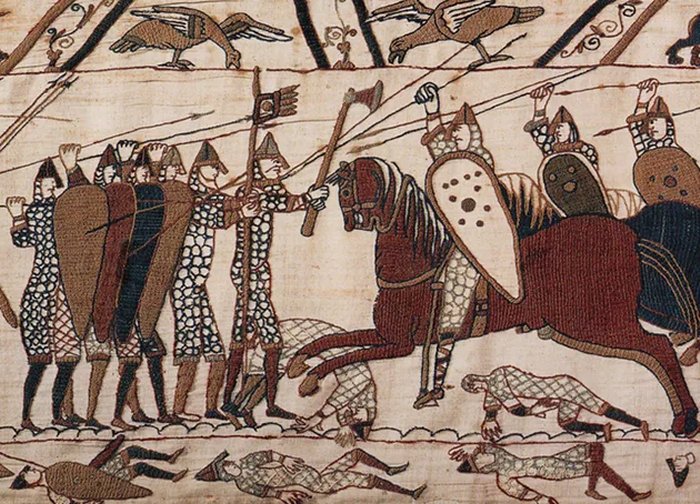
The Normans attacking the Anglo-Saxon shield castle at Hastings in southeast England in October 1066. The battle put Rollo's descendants on the throne of England . Bayeux Tapestry
When researchers opened the tomb, a sarcophagus on the floor of a Fécamp monastery, they discovered Richard the Good’s lower jaw with eight teeth. A DNA analysis is likely to be completed by the autumn and will be presented in cooperation with the French authorities.
Experts can not investigate the remains of Rollo, because his sarcophagus in the Cathedral at Rouen is empty. However, teeth of a close relative are considered excellent genetic and the researchers are optimistic about finding intact DNA.
“Finding teeth is key because DNA can be found there even after this many years. Two forensic experts from Norway and Denmark took five teeth that will now be sent to the University of Oslo and the Centre for GeoGenetics at the University of Copenhagen for analysis,” Ole Bjørn Fausa, the founder of one of the project’s sponsors, the Samlerhuset Group, said.
Fausa said that if Rollo is confirmed to be Ganger Hrólf, it will have great historical significance.
“If the British royal family originates from the northern part of Western Norway, it will change the perception that the Norwegian royal family is relatively young with origins from the British and Danish royal houses,” he said.
Only when the analysis is complete will Danish and Norwegian historians be able to settle their conflicting claims on Rollo.
AncientPages.com
Expand for referencesMore From Ancient Pages
-
 Mystery Of The Ancient Moonless Ones – Strange Tales Of Unusual Lost Civilizations
Ancient Mysteries | Jan 29, 2022
Mystery Of The Ancient Moonless Ones – Strange Tales Of Unusual Lost Civilizations
Ancient Mysteries | Jan 29, 2022 -
 Evolution Of Tree Roots Led To Ancient Mass Extinctions – Geologists Say
Archaeology | Nov 11, 2022
Evolution Of Tree Roots Led To Ancient Mass Extinctions – Geologists Say
Archaeology | Nov 11, 2022 -
 Mystery Of The Sandby Borg Massacre Deepens – Unexplained Disappearance Of Women
Featured Stories | Dec 5, 2020
Mystery Of The Sandby Borg Massacre Deepens – Unexplained Disappearance Of Women
Featured Stories | Dec 5, 2020 -
 Rare Gold Coins And Treasures Linked To Crusaders’ Conquest Of Caesarea – Discovered
Archaeology | Dec 4, 2018
Rare Gold Coins And Treasures Linked To Crusaders’ Conquest Of Caesarea – Discovered
Archaeology | Dec 4, 2018 -
 Archaeological Mystery – Why Has Only One Such Puzzling Ancient Object Been Found In Norway?
Ancient Mysteries | Aug 8, 2024
Archaeological Mystery – Why Has Only One Such Puzzling Ancient Object Been Found In Norway?
Ancient Mysteries | Aug 8, 2024 -
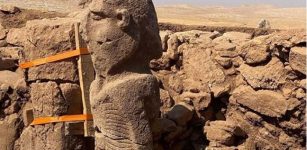 World’s Oldest Human Statue Discovered At Karahan Tepe, Turkey
Archaeology | Oct 30, 2023
World’s Oldest Human Statue Discovered At Karahan Tepe, Turkey
Archaeology | Oct 30, 2023 -
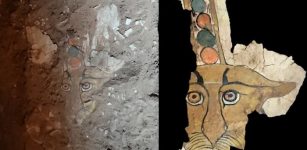 Rare Ancient Leopard Painting Discovered On Sarcophagus In Aswan, Egypt
Archaeology | Feb 25, 2020
Rare Ancient Leopard Painting Discovered On Sarcophagus In Aswan, Egypt
Archaeology | Feb 25, 2020 -
 Statue Of Goddess Cybele Looted In The 1960s Returned To Turkey
Artifacts | Dec 22, 2020
Statue Of Goddess Cybele Looted In The 1960s Returned To Turkey
Artifacts | Dec 22, 2020 -
 Unexplained Encounters With Unknown Beings In California – Old And Modern Reports
Featured Stories | Mar 11, 2024
Unexplained Encounters With Unknown Beings In California – Old And Modern Reports
Featured Stories | Mar 11, 2024 -
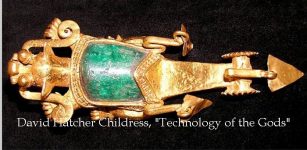 Prehistoric Heavy Machinery Of The Ancient Times Or A Piece Of Jewelry?
Ancient Technology | Sep 12, 2018
Prehistoric Heavy Machinery Of The Ancient Times Or A Piece Of Jewelry?
Ancient Technology | Sep 12, 2018 -
 Earliest Evidence For Domestic Yak – Revealed By Ancient DNA And Archaeology
Archaeology | Dec 15, 2023
Earliest Evidence For Domestic Yak – Revealed By Ancient DNA And Archaeology
Archaeology | Dec 15, 2023 -
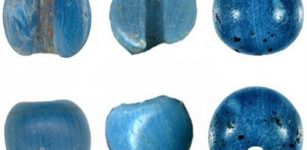 How Did These Beautiful Venetian Glass Beads Reach North America Long Before Columbus?
Archaeology | Feb 15, 2021
How Did These Beautiful Venetian Glass Beads Reach North America Long Before Columbus?
Archaeology | Feb 15, 2021 -
 Stunning Discovery Of 1,000-Year-Old Knight’s Sword From Reign Of Poland’s First King Bolesław The Brave
Archaeology | Jul 28, 2022
Stunning Discovery Of 1,000-Year-Old Knight’s Sword From Reign Of Poland’s First King Bolesław The Brave
Archaeology | Jul 28, 2022 -
 Why Was Lovesickness A Feared Disease During The Middle Ages?
Ancient History Facts | Feb 8, 2018
Why Was Lovesickness A Feared Disease During The Middle Ages?
Ancient History Facts | Feb 8, 2018 -
 On This Day In History: National Hero Paul Revere Warns Of The British Coming – On Apr 18, 1775
News | Apr 18, 2017
On This Day In History: National Hero Paul Revere Warns Of The British Coming – On Apr 18, 1775
News | Apr 18, 2017 -
 Strange Ancient Artifact Found In New Jersey May Be Evidence Of A Long-Lost Advanced Civilization
Featured Stories | Jun 27, 2024
Strange Ancient Artifact Found In New Jersey May Be Evidence Of A Long-Lost Advanced Civilization
Featured Stories | Jun 27, 2024 -
 Enchanted Ancient Egyptian Amulet Seal Discovered In Türkiye’s Amasra
Archaeology | Nov 15, 2022
Enchanted Ancient Egyptian Amulet Seal Discovered In Türkiye’s Amasra
Archaeology | Nov 15, 2022 -
 History Shows: Taxes And Bureaucracy Are Cornerstones Of Democracy
Archaeology | Feb 18, 2021
History Shows: Taxes And Bureaucracy Are Cornerstones Of Democracy
Archaeology | Feb 18, 2021 -
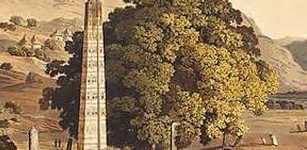 Ancient African Empires’ Impact On Migration Revealed By Genetics
Archaeology | Mar 31, 2023
Ancient African Empires’ Impact On Migration Revealed By Genetics
Archaeology | Mar 31, 2023 -
 Surprising Discovery Reveals Why Medieval Graves Were Re-Opened – Stealing Was Not The Purpose
Archaeology | May 24, 2017
Surprising Discovery Reveals Why Medieval Graves Were Re-Opened – Stealing Was Not The Purpose
Archaeology | May 24, 2017



